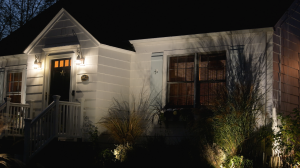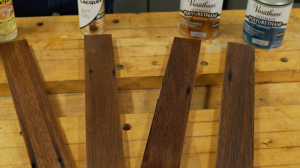RON HAZELTON:
Well, no question about it: Fall's here, and cold weather is just around the corner. Now I always imagined that meant a lawn was preparing for a long winter's nap. I mowed for the last time, and I assumed there was nothing more for me to do.
But on a whim I decided to check it out with some experts, and [LAUGHS] boy - did I get a surprise.
[BELL ATTACHED TO DOOR RINGS]
RON HAZELTON:
Ashton Richie is a lawn and garden expert with Scott’s. Now he says my lawn needs me… right now… my grass may look like it’s snoozing but when you get to the root of things a lot’s going on beneath the surface… sounds like some turf talk comin’ my way.
[Music End]
Now tell me something -- why did you get two different kinds of fertilizer here?
MAN:
Well, Ron, they're both winterizer. Which --November is the perfect time to winterize your law. Lot of people forget about their lawn this time of year. This is the time to winterize a lawn. But one has a weed control, and one doesn't have a weed control. I noticed that in some parts of your lawn you've got some clover,
[LAUGHTER]
and some other kinds of weed, so [...?...]--
[BOTH SPEAK AT ONCE]
RON HAZELTON:
I have weeds?! [LAUGHS]
[BOTH SPEAK AT ONCE]
MAN:
In a few places -- and this is the perfect time of the year to take care of that. Use the winterizer with the plus two weed control - it takes care of the weeds - and then we've got the regular winterizer for the other parts of the law where you don't have any weeds.
RON HAZELTON:
Would it hurt to put the weed-killer on parts of the lawn where there are no weeds?
MAN:
No, it's just no need to do it. If there's no weeds there, then we just might as well use the regular winterizer.
RON HAZELTON:
Okay.
MAN:
But I'll tell you what, Ron -- I've got some good news for you and some bad news. Come over here -- let me show you--
[BOTH SPEAK AT ONCE]
RON HAZELTON:
Give me the good news first, please.
MAN:
Okay.
[MUSIC TAG]
MAN:
Well, the good news, Ron is you've got a lawn. Okay? In most areas, you've got grass. And this is a perfect time to feed it. You feed it now with a winterizer, and you will really help the grass not only now in the fall but also next spring.
RON HAZELTON:
You know, my impression was that grass sort of went dormant in the winter, so why would you want to feed it just before winter approaches?
MAN:
You know I think a lot of people feel that, but the important thing now is what's happening where you can't see it, and that's the root growth. And if you feed it now when Mother Nature is turning out all those new roots, then the grass is going to have even more root growth, and it's going to stockpile nutrients, and it'll be a lot stronger for next year.
RON HAZELTON:
So this is the time of year when grass kind of turns its attention to its roots?
MAN:
Well, it's, it's like a food reserve. You know, you go into the winter, and you know, I've noticed that you have a little extra food reserve right there; didn't notice that but--
RON HAZELTON:
You sure know how to get to a guy, it’s my weeds.
[BOTH SPEAK AT ONCE]
MAN:
[LAUGHS] That's me too.
RON HAZELTON:
Now it's my belly.
[LAUGHTER]
MAN:
We have food. We need to eat three meals a day, [LAUGHS], and the lawn needs to eat the same way. I mean you know, you feed it now, it's - and it stores up nutrients, and then it's a lot stronger next year. A lot healthier.
[BOTH SPEAK AT ONCE]
RON HAZELTON:
So it's actually storing nutrients for next spring in the root system?
MAN:
That's correct.
RON HAZELTON:
So my timing is-- is really.
[BOTH SPEAK AT ONCE]
MAN:
Your timing is perfect. That's the good news.
RON HAZELTON:
What's the bad news?
MAN:
Well-- [LAUGHS] well Ron the bad news is, we should - well I shouldn't say we - you should get all these leaves off the lawn before we fertilize.
[MUSIC & ELECTRIC TOOL]
[MUSIC]
[BACKGROUND CONVERSATION]
I don’t know what came over me. There was this mountain of leaves, so neatly mounded up… calling, beckoning… like a schoolyard troublemaker taunting me to mess up their hair… I tried to resist… but suddenly…
[MUSIC ENDS]
MAN:
Ron--Ron! Ron, looks like you were daydreaming there for a second.
RON HAZELTON:
I was flashing back to my childhood.
[MUSIC TAG]
MAN:
You've got a good stand of grass here, but you've got some weeds in it, and-- we're going to point the winterizer Plus 2 down on moist foliage so that the-- so that the particles will stick on the weeds, get absorbed down into the root, kill it, root system and all, and you want to pick a day when you're going to get a couple of, three days of 50 to 60 degree weather.
If it's, if you're not getting that any more; if you're part of the country where it's really, really cold--
[MUSIC UP AND UNDER]
then it's probably too late to put it down.
[BACKGROUND CONVERSATION]
[MUSIC UNDER WORK, CONTINUES UNDER NEXT]
RON HAZELTON:
Well, I figure there will be a few more 50 degree days before old man winter settles in… so I load up the rotary spreader. On the fertilizer bag I find the spreader rate and dial in the correct setting. Then I swing the edge guard into position and fertilize the perimeter of the yard first. The edge guard prevents fertilizer from getting onto pavement and into flower beds. Once the edges are finished I make parallel passes across the lawn moving over about five feet after each one.
So that's all there was to it. That was not very difficult.
MAN:
No. And your lawn's going to look great. You know, in fact you'll be so pleased with how it looks going into the winter and how it'll look next spring.
RON HAZELTON:
So when will I see you again?
MAN:
How about if I come back in the spring and let's see how much progress it made, and then we'll take it from there, and we'll figure out what we need to do next year.
RON HAZELTON:
You're on.








